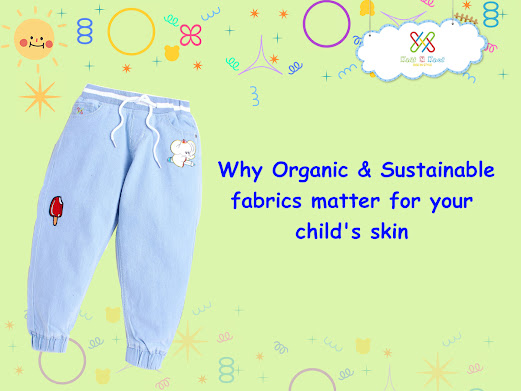Why Organic & Sustainable Fabrics Matter for Your Child’s Skin
In today’s eco‑conscious
world, parents are increasingly reaching for organic clothing and organiccotton garments—especially when it comes to kids. But beyond style and
sustainability, there's a deeper reason: the health and comfort of your child’s
skin.
1. Gentleon Delicate Skin
Kids have softer,
more absorbent skin than adults, making them more susceptible to irritation.
Conventional cotton often involves pesticides, synthetic fertilizers, bleaches,
and harsh dyes, all of which can leave residue that triggers rashes, itching,
or eczema.
In contrast, organic cotton is grown and processed without these harmful
chemicals, ensuring that every stitch is free from irritants and safe for children.
2. Breathable and Hypoallergenic
Organic fabrics
allow better air circulation, helping to regulate body temperature and prevent
moisture buildup. This
breathability ensures that your child stays cool and comfortable, especially
during warmer months. Organic
fabrics like cotton, bamboo allow better airflow and wick moisture away from
the skin—crucial for regulating a child’s body temperature and preventing
prickly heat or infections.They also exhibit hypoallergenic properties,
reducing the chances of allergic reactions and making them perfect for children
with sensitive skin or eczema.
3. Durability That Supports Active Play
Despite their
softness, organic cotton garments are incredibly long‑lasting. Because they’re
made without harsh chemicals that can weaken fibers, they stand up well to
repeated washing and playtime wear. Kids are tough on clothes. But organic fibers, not
weakened by chemicals, often last longer and retain their softness and color
through countless washes. Opting for organic also means garments can be handed
down or resold, stretching their lifecycle and value.
4. Environmentally
Friendly
Choosing organic cotton supports sustainable farming
practices that are better for the environment. It
reduces water consumption, avoids harmful pesticides, and promotes healthier
ecosystems. By selecting organic clothing, you're contributing to a more sustainable future
for your child.
Cultivating
organic fabrics fosters biodiversity, reduces pesticide pollution, and
conserves water. For example, organic
cotton uses significantly less water than its conventional counterpart and
avoids contaminating local ecosystems.Choosing these materials teaches children
about caring for the world they'll inherit.
5. Finding the Right Stores for Kids Clothes
When searching
for quality kids clothes, it's important to look for stores and brands
that carry certified organic items. Brands like Knit And Knot is leading the
way with stylish, sustainable options that are gentle on skin.
Knit N Knot
One standout
brand is Knit N Knot, an Indian
sustainable kidswear line committed to comfort, style, and ethical production.
Every piece is crafted from 100% organic
cotton, designed with breathable, biodegradable packaging—and made
with love for little explorers. Their collections range from basics to festive
wear, perfect for parents hunting for gentle, skin‑friendly organic cotton
garments in children cloth shops.
Knit
& Knot child‑friendly
sustainability:
Natural
& Certified Fibers: Uses
GOTS-certified organic cotton and renewable fibers like merino wool and mohair.
Kid-Comfort
Focused: Their relaxed, stretch-friendly knits mean comfort and freedom
for active kids.
Ethical
& Eco Process: From no-animal-harm sourcing to
biodegradable packaging and fair wages, they uphold eco-integrity.
Durability
by Design: Knit & Knot’s knits are made to last for years and even
passed down—perfect for growing children.


Comments
Post a Comment